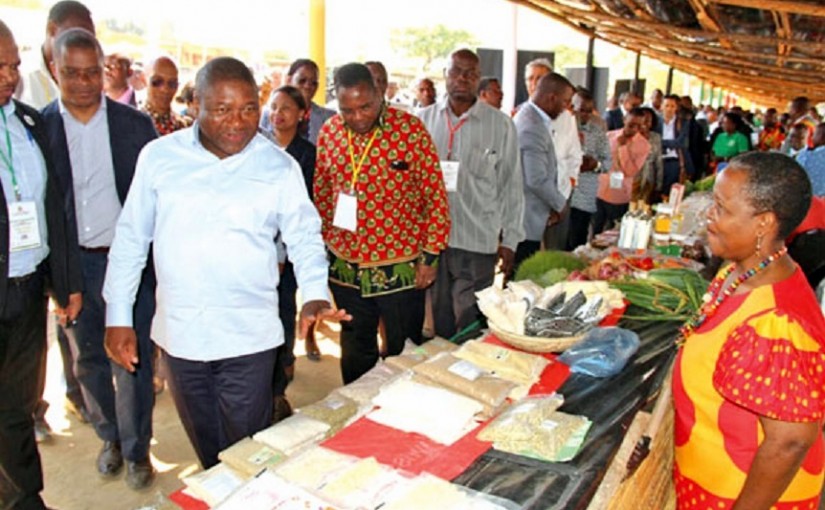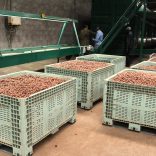Mozambique: Chapo launches 2025 agricultural marketing campaign - Watch
Nyusi: “We have no choice. We have to transform the agriculture, livestock and fisheries sectors”

Notícias / President Nyusi in Manica yesterday
Mozambican President Filipe Nyusi declared on Monday that his government is determined to break with the low levels of production and productivity that have characterised Mozambican agriculture in the first four decades of independence.
“We want to open a broad space for an increase in agricultural productivity, in terms of the use of new technologies and expanding access to credit, to markets and to technical assistance”, he said at the First Meeting of Agricultural and Fisheries Entrepreneurs, held in Gondola, in the central province of Manica.
Nyusi noted that of the 4.2 million farms in the country, 98.9 per cent are described as small. 5.7 million people work on them, which corresponds to 72 per cent of the total work force.
The technologies employed are rudimentary. Less than four per cent of these smallholder farmers use fertilizer, said Nyusi, and less than five per cent use pesticides. Less than 10 per cent use improved seeds, and less than six per cent have access to credit. About nine per cent have access to agricultural extension services.
Most production on these tiny farms is consumed by the farmers themselves and their households. Only 25 per cent of the farmers regularly sell surplus crops on the market.
Nyusi declared “I am here because I do not accept a situation where we are in deficit in the main foodstuffs” – a deficit that has continued even though independent Mozambique always defined agriculture as the basis for its development.
“We want our country to stop being part of the map of hunger and poverty”, the President added. “Everything must be done for us to emerge from the shame of having a country which can give us everything, but which we human beings do not take advantage of. We do not take from it what Mother Nature deliberately placed in our country”.
“We intend that agriculture, livestock, forestry, fisheries and fish farming will lead the economic process of structural transformation that we propose to undertake”, he said.
As for fisheries, Nyusi admitted that the fishing of some species is reaching its maximum sustainable limits. The alternative was aquaculture – Nyusi was confident that a million tonnes of fisheries produce a year can be farmed in both sea water and fresh water. This is three times more than the 370,000 tonnes which is the maximum that can be obtained from the orthodox, extractive forms of fishing.
“We have no choice”, argued Nyusi. “We have to transform the agriculture, livestock and fisheries sectors. That requires a change in attitude and in development paradigm. We want to embark upon these enticing changes that will alter the face of Mozambique”.
The Forum is taking place under the motto “Mozambique – creating wealth: partnerships and synergies in the agriculture and fisheries sector”. This motto was not just a matter of theory, insisted the President. “For us, it strengthens the conviction that together, and with a common vision, we can comply more easily with our development agenda”.
Events such as the Forum, with the presence of small, medium and large scale producers from across the country, “offer us an occasion for dispassionate discussion about the dilemmas, challenges and opportunities of the agricultural and fisheries business sector”, he said.
Nyusi noted that agricultural exports currently account for 16 per cent of Mozambique’s exports, and the opportunities exist to increase this. He stressed in particular sugar, cotton and cashew nuts.
With the revival of cashew processing, today more processed cashew kernels leave the country than raw, unprocessed nuts. “We have reversed the proportions”, said Nyusi. “Today, 80 per cent of the cashew nuts exported are processed and 20 per cent are raw. There is an umbilical relationship between the producers and the agro-industrial operators. The cashew producers supply raw material to the industries and these provide cashew kernels for the domestic and export markets”.
Nyusi admitted “we still have a long way to go to achieve the ideal indices of productivity and competitiveness, particularly in the production of food to substitute imports, and in producing raw materials in sufficient quantity and quality to stimulate our industry, and increase exports”.
Private business, he said, was “an essential part of the solution for the prevailing economic problems, and the government was therefore “fully committed to establishing an ever more inviting business environment for national and foreign private investment”.












Leave a Reply
Be the First to Comment!
You must be logged in to post a comment.
You must be logged in to post a comment.